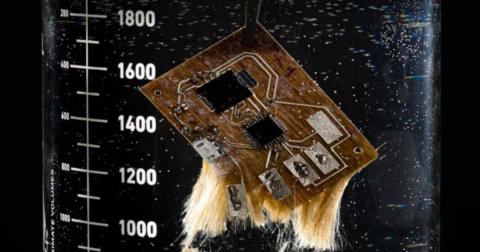
Advancements in Sustainable PCB Materials and Collaborative Projects
The global electronics industry is witnessing significant advancements in the development of sustainable Printed Circuit Board (PCB) materials. This progress not only aims to reduce dependency on imported raw materials but also addresses the growing concern of electronic waste. Jiva Materials Ltd. and its partner, Printed Electronics Ltd. (PEL), have embarked on a collaborative project to develop a variant of the open-source Arduino microcontroller, known as Soluboard. This innovative PCB material offers the potential for biodegradability and recycling, thereby contributing to a circular economy in the electronics industry.
Advantages of Soluboard:
Soluboard, developed by Jiva Materials Ltd., is a fully biodegradable PCB material made from a combination of polymers and halogen-free flame retardants infused with natural fibers. This sustainable alternative is expected to play a vital role in reducing environmental pollution caused by traditional electronic waste. With an estimated global production of over 50 million tons of electronic waste annually, Soluboard presents an eco-friendly solution for mitigating the impact of electronic waste.
Collaborations and Sustainable Goals:
Jiva Materials Ltd. has actively sought collaborations to further the development and implementation of Soluboard in the electronics industry. The company has partnered with major players like PEL and Microsoft to explore the use of Soluboard in their respective projects. For instance, collaborative efforts with PEL have resulted in the creation of an open-source Arduino variant, which promises to be a widely-used microcontroller within the maker community. Jiva's collaboration with Microsoft aims to develop "earth-friendly" electronic products, aiding Microsoft's goal to achieve carbon negativity and zero waste by 2030.
Limitations and Future Prospects:
While Soluboard exhibits great promise, there are challenges to overcome before its widespread adoption in commercial electronic products. Issues such as performance and cost need to be addressed through ongoing collaborations with industry partners. Continued research and development, as well as expanding collaborations, are expected to significantly reduce the time required for Soluboard's commercial viability. Furthermore, Jiva is also actively developing application materials suitable for fibers like jute, which can provide additional options for sustainable PCB manufacturing.
AMPLE CHIP and Chip Trade:
In the realm of chip trading, one prominent company is Ample Chip. While the provided context information did not mention this specific company, Ample Chip is engaged in the chip trade business. Their expertise lies in facilitating chip transactions, connecting manufacturers and buyers in the global chip market. By leveraging their extensive network and market knowledge, Ample Chip contributes to the smooth flow of chip trade and fosters partnerships worldwide.
Conclusion:
Advancements in sustainable PCB materials, such as Soluboard, demonstrate a shift towards a more environmentally conscious electronics industry. Collaborative projects between Jiva Materials Ltd., PEL, and Microsoft highlight the industry's commitment to reducing carbon emissions, minimizing electronic waste, and achieving circularity. With ongoing research and development, Soluboard holds the potential to address the challenges of traditional PCB materials while providing a pathway to a greener future. Concurrently, Ample Chip plays a pivotal role in facilitating chip trade, serving as a vital link in the global chip market.


